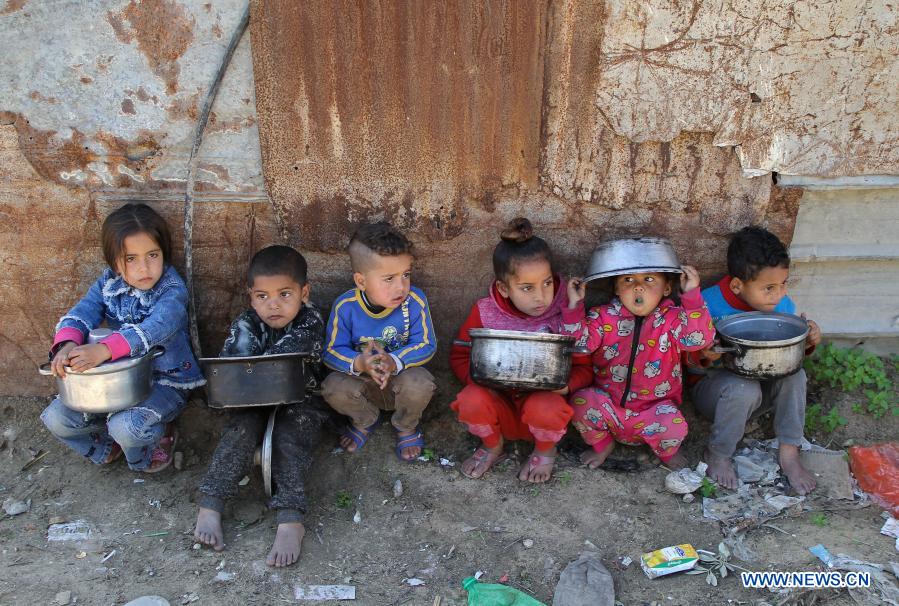
Palestinian children wait to receive charity meals at al-Zaitoun neighborhood in the east of Gaza City, on Feb. 8, 2021. Samira Abu Amra, a Palestinian woman from al-Zaitoun neighborhood in the east of Gaza city, cooks a massive amount of food twice a week for the neighboring families in need. (Photo by Rizek Abdeljawad/Xinhua)
by Sanaa Kamal
GAZA, Feb. 25 (Xinhua) -- Samira Abu Amra, a Palestinian woman from al-Zaitoun neighborhood in the east of Gaza city, cooks a massive amount of food twice a week for the neighboring families in need.
She came up with the idea after a benefactor from Kuwait donated her some money that she decided to share with neighbors by providing them with free food.
"The people here rarely eat meat because they cannot afford it, so I am trying to pamper them with delicious meals," the 48-year-old woman said, while holding a large spoon and stirring a potato soup.
Gaza is home to thousands of needy families that lack the basic necessities of life such as food, clothing and housing.
On Mondays and Thursdays, dozens of children queue in front of Amra's house to enjoy her dishes.
Mohammed Ahmed, 12, gave an ear-to-ear grin when it was his turn to get the ration for his 10-member family.
"My father does not work and we do not have money to buy meat," the boy told Xinhua.
"We live in a forgotten area. No one remembers us herr. Only Samira does. She is a poor woman and knows our feelings," Ahmed said.
"I feel happy when I see the smiles on the children's faces when they take their food," Amra said, adding she knew "how it hurts when you cannot find food."
As one of the most densely populated areas in the world, the Gaza Strip has been under a tight Israeli blockade since the summer of 2007, when Hamas forcibly seized the Palestinian coastal enclave from the forces loyal to the Palestinian Authority.
The 2007 crisis also further severed Gaza's access to humanitarian assistance. In September 2020, the UN Special Rapporteur on the situation of human rights in Palestinian Territory commented that Gaza was on the brink of being unliveable.
Amani Sayed, a mother in her 30s, expressed her happiness that she was able to feed her children with Amra's assistance.
"It is not easy to see your children (hungry) without food, but what can we do amid these unprecedented economic crises?" she lamented.
Sayed said her husband lost his job a year ago when the coronavirus started to spread in Gaza and the Hama authorities imposed lockdown on the enclave.
"In the past, my husband and I were able to keep our children afloat, but now everything has changed and the situation has deteriorated," she told Xinhua.
According to official Palestinian statistics and the World Bank, the unemployment rate in Gaza, which had reached 46 percent in early 2020, is among the highest in the world.
In addition, the poverty rate and the extreme poverty rate in Gaza have risen to 53 percent and 33.8 percent respectively, according to the latest statistics issued by the Palestinian Central Bureau of Statistics. Enditem




